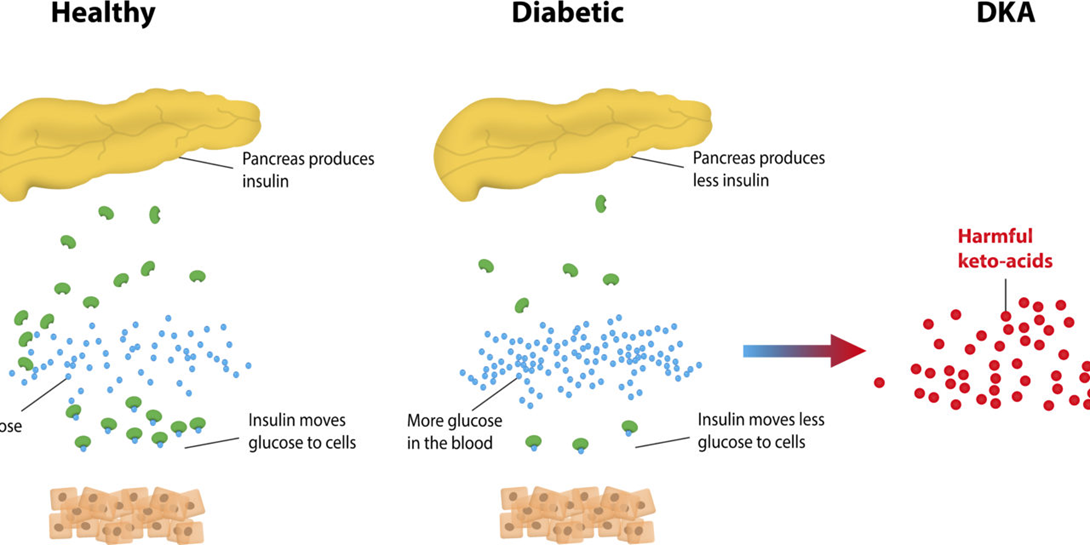A nurse is teaching a client who has diabetes mellitus and a new prescription for glimepiride. The nurse should teach the client to avoid which of the following drinks while taking this medication?
Alcohol
Milk
Grapefruit juice
Coffee
The Correct Answer is A
The correct answer is a. Alcohol.
Choice A: Alcohol
Reason: Alcohol can significantly affect blood glucose levels in patients taking glimepiride. Both hypoglycemia (low blood sugar) and hyperglycemia (high blood sugar) can occur depending on the amount and frequency of alcohol consumption. Alcohol can enhance the blood sugar-lowering effect of glimepiride, leading to a dangerous drop in blood sugar levels, known as hypoglycemia. Symptoms of hypoglycemia include dizziness, confusion, weakness, and in severe cases, loss of consciousness. Therefore, it is advised to avoid alcohol while taking glimepiride.
Choice B: Milk
Reason: There are no known interactions between glimepiride and milk. Milk does not affect the absorption or efficacy of glimepiride. Therefore, it is generally safe to consume milk while taking this medication.
Choice C: Grapefruit juice
Reason: Grapefruit juice might theoretically increase the levels of drugs metabolized by CYP2C9, including glimepiride, due to its potential to inhibit CYP2C9 enzymes. However, this interaction has not been reported in humans and is considered unlikely to have a significant clinical impact. Therefore, grapefruit juice is not a major concern for patients taking glimepiride.
Choice D: Coffee
Reason: Coffee and other caffeinated beverages may increase blood sugar levels, which can counteract the effects of glimepiride. However, this interaction is not as significant as the interaction with alcohol. It is generally advised to monitor blood sugar levels and consume coffee in moderation while taking glimepiride.
Nursing Test Bank
Naxlex Comprehensive Predictor Exams
Related Questions
Correct Answer is B
Explanation
Choice A reason: Antibiotics are not likely to interact with corticosteroids, unless they are aminoglycosides, which can increase the risk of hypokalemia. However, most antibiotics do not affect the metabolism or efficacy of corticosteroids.
Choice B reason: Nonsteroidal anti-inflammatory drugs (NSAIDs) can interact with corticosteroids, as they both have anti-inflammatory and immunosuppressive effects. This can increase the risk of gastrointestinal bleeding, ulceration, and perforation. Therefore, the nurse should monitor the patient for signs of bleeding and advise the patient to avoid taking NSAIDs with corticosteroids.
Choice C reason: Opioid analgesics are not likely to interact with corticosteroids, unless they are codeine, which can decrease the clearance of corticosteroids. However, most opioid analgesics do not affect the metabolism or efficacy of corticosteroids.
Choice D reason: Antidepressants are not likely to interact with corticosteroids, unless they are monoamine oxidase inhibitors (MAOIs), which can increase the risk of hypertension and hypertensive crisis. However, most antidepressants do not affect the metabolism or efficacy of corticosteroids.
Correct Answer is B
Explanation
Choice A reason: Insulin glargine is not the type of insulin to use for diabetic ketoacidosis, as it is a long-acting insulin that has a duration of 24 hours and no peak effect. It is used to provide basal insulin coverage and prevent hyperglycemia.
Choice B reason: Regular insulin is the type of insulin to use for diabetic ketoacidosis, as it is a short-acting insulin that has an onset of 30 to 60 minutes and a peak of 2 to 4 hours. It is used to lower the blood glucose level rapidly and correct the acidosis.

Choice C reason: Insulin detemir is also not the type of insulin to use for diabetic ketoacidosis, as it is a long-acting insulin that has a duration of 12 to 24 hours and no peak effect. It is also used to provide basal insulin coverage and prevent hyperglycemia.
Choice D reason: NPH insulin is also not the type of insulin to use for diabetic ketoacidosis, as it is an intermediate-acting insulin that has an onset of 2 to 4 hours and a peak of 4 to 12 hours. It is used to provide intermediate insulin coverage and prevent hyperglycemia.
Whether you are a student looking to ace your exams or a practicing nurse seeking to enhance your expertise , our nursing education contents will empower you with the confidence and competence to make a difference in the lives of patients and become a respected leader in the healthcare field.
Visit Naxlex, invest in your future and unlock endless possibilities with our unparalleled nursing education contents today
Report Wrong Answer on the Current Question
Do you disagree with the answer? If yes, what is your expected answer? Explain.
Kindly be descriptive with the issue you are facing.
